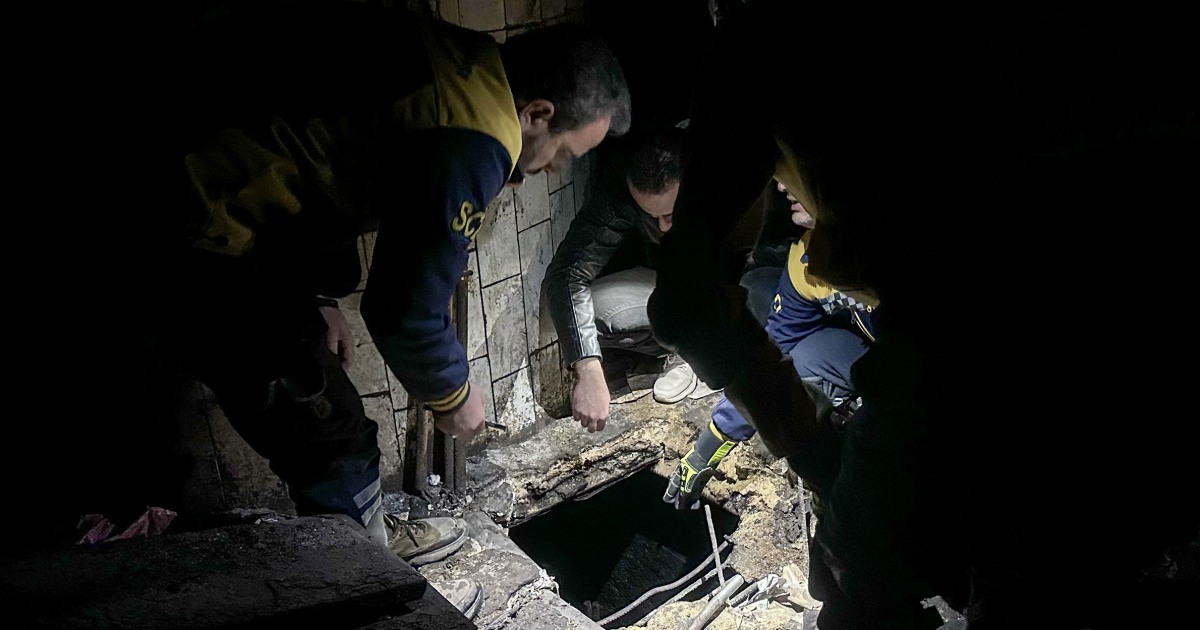Powerful images have emerged showing Syrians, including women and children, being freed from prisons across the country after the toppling of President Bashar Al-Assad.
His brutal regime saw hundreds of thousands of political prisoners disappear into jails under harrowing conditions, and on Monday Assad was in Moscow having fled the country while one notorious facility was being searched for signs of secret underground cells.
Men in one video verified by NBC News could be seen cheering as they were released by fighters who shot the lock off the doors then entered Saydnaya prison, known to some as the “Human Slaughterhouse,” near Damascus in the hours after rebel forces captured the Syrian capital.
In another video, a little boy appeared to be be seen toddling out of a cell as women around him rejoiced, with some expressing confusion after being told they’d been freed and asking for their belongings and their identification cards.
But harrowing stories also emerged, and rescue teams rushed to search Saydnaya prison after receiving reports of detainees being held in “hidden underground cells,” with families also racing to the facility in hopes of finding their loved ones there.
The White Helmets rescue organization said it had deployed five specialized emergency teams to search for prison cells believed to be hidden underground at the notorious prison, citing survivors’ accounts.
Those teams are compromised of search and rescue units, wall-breaching specialists, iron door-opening crews, trained dog units, and medical responders,” the White Helmets said in a statement shared on X, adding that the crews were “well trained and equipped to manage such complex operations.”
As of early Monday, the group said there was “no evidence confirming the presence of detainees in the basements or cellars of the prison,” with search efforts still underway.
Freed just in time
Bashar Barhoum, who was freed from a prison cell in Damascus as dawn broke on Sunday, said he would have been dead if emancipation had come even a day later.
The 63-year-old writer told The Associated Press news agency that he was meant to be executed seven months after being taken prisoner — but instead of being led to his execution on Sunday, he was brought to freedom.
“I haven’t seen the sun until today,” he said. “Instead of being dead tomorrow, thank God, he gave me a new lease of life.”
Salem Alaya, who fled Syria and settled in Britain as a refugee in 2014, said he cried as he watched videos of people being freed from prison cells.
“When my dad passed away, I did not cry like I did yesterday,” said Alaya, 38, noting that he never got to say goodbye to his father, who died in 2016.
“I was just crying,” he told NBC News.
Alaya, who helps run a Facebook group supporting Syrian refugees arriving in London, said he had several friends and loved ones, including two uncles, who have been held as political prisoners in Syrian jails for years with no word on their whereabouts or wellbeing.
“Maybe they died. Maybe they disappeared. Maybe they have been killed inside the prison,” he said. “I hope that we can hear about them.”

Alaya, a father of three, said he was desperate to return to Syria to visit his family — and to finally be reunited with his mother after so many years apart.
“As soon as they open the airport, I will be there and I will kiss the soil of Syria,” he said.
Still, he said that after having to flee his home, his life with his wife and three children, ages 5, 9 and 10, was now in London, with his heart and hopes for the future split across the globe, a reality shared by many refugees and asylum seekers.
Alaya said he was among the many Syrians in London to celebrate after news broke that Assad had been overthrown, bringing an end to 50 years of his family’s rule and 13 years into a devastating civil war.
Photos and videos showed Syrians celebrating Assad’s ouster around the world, with crowds in Damascus honking horns, waving flags and firing guns into the air.
People could also be seen toppling statues of Assad’s father Hafez al-in cities across Syria, including in the Assad stronghold of Latakia.
In the midst of the celebrations, there were also concerns over what might lie ahead ahead for the country, as well as for the region.
The U.S. struck ISIS camps and Israel said it had struck suspected chemical weapons sites and long-range rockets to stop them falling into militant hands.
President Joe Biden described this as “a moment of risk and uncertainty,” as leaders from around the world expressed hopes for stability in the wake of Assad’s toppling.

